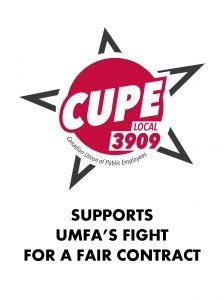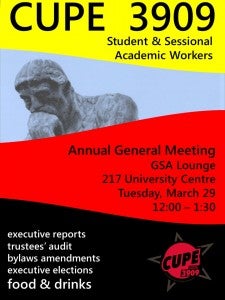As you are already aware, there is a very strong possibility that the University of Manitoba Faculty Association (UMFA) could be on strike at the University of Manitoba in the next few weeks. The Faculty Union has been bargaining with the University since last spring and the parties have been unable to reach an agreement. UMFA has taken a strike vote and received a strong mandate from their membership to strike.
Join us at the information picket
On Friday, October 21 at 12:00, UMFA members and supporters will be holding an information picket in front of the Administration Building (Fort Garry Campus). The CUPE 3909 Executive will be there and we are extending the invitation to all of our members so that the information picket can have the strongest possible impact.
Where does a potential UMFA strike and picket line leave CUPE 3909 members?
First of all, it should be made clear that as a Union, we support UMFA in their struggle to obtain a fair collective agreement for their members.
What does this mean in a practical sense?
The CUPE 3909 Executive will meet with UMFA to find out what they would like us to do to assist them and to demonstrate our support. We will also convene a meeting with the other campus Unions (AESES, UNIFOR, CUPE 1482) in an effort to have a collective response to the strike. We will keep the membership informed of the outcome of these meetings.
What does this mean for you as a member who may be facing a picket line?
CUPE 3909 hopes to demonstrate our support for the strike in the strongest manner possible. We are hoping that our discussions with UMFA and the other Unions produce some effective strategies.
However, we would be remiss in our responsibilities as your Executive if we did not properly inform you of the legal restrictions which we may face. While the Labour Law in Manitoba does protect an employee who refuses to take on extra work that would normally be done by striking employees, it does not provide the same protection to employees who refuse to cross a picket line. This means that we could be deemed to be in violation of our employment contract if we fail to go to work and do our jobs. This is a problem.
We are looking into alternatives and solutions to this problem and will keep you updated on the situation. We will provide you with leadership and advice on a timely basis.
In the meantime, contact us with any questions or concerns and see you at the information picket!
Below are some links that you may find of interest.
http://umfa.ca/news/42-umfa-information-picket
http://umfa.ca/news/38-strike-vote-members-reaffirm-their-priorities
http://umfa.ca/news/37-collective-bargaining-continues
https://www.change.org/p/umfa-students-supporting-their-profs-u-of-m
http://umfa.ca/news/41-umfa-strike-vote-faq-for-students
 Remember to show your support as you enter campus. Stop and talk to UMFA members and join them on the picket lines before or after your scheduled hours. We’ll have CUPE 3909 pickets available for our members at each of the entrances – or download a poster.
Remember to show your support as you enter campus. Stop and talk to UMFA members and join them on the picket lines before or after your scheduled hours. We’ll have CUPE 3909 pickets available for our members at each of the entrances – or download a poster.
